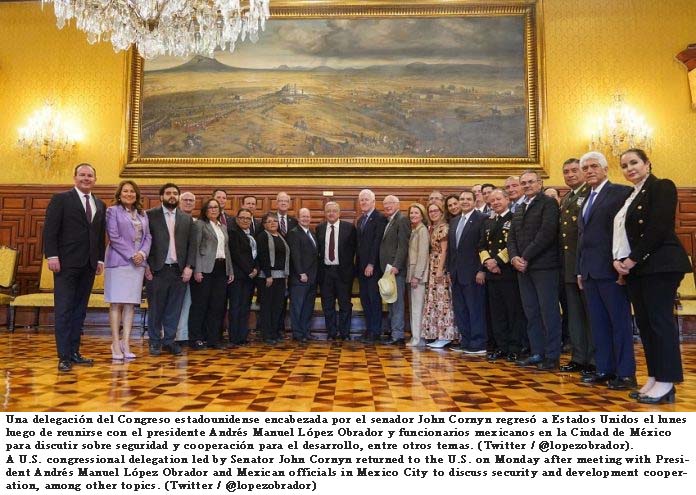photo: A U.S. congressional delegation led by Senator John Cornyn returned to the U.S. on Monday after meeting with President Andrés Manuel López Obrador and Mexican officials in Mexico City to discuss security and development cooperation, among other topics. (Twitter / @lopezobrador)
by Mexico News Daily
President López Obrador said Monday that migration, development cooperation and security were among the topics discussed at his meeting with 12 United States lawmakers in Mexico City on Sunday.
“The meeting was very good, very respectful, and we reached agreements to continue working together with respect for our sovereignties,” he told reporters at his regular morning news conference.
The U.S. delegation was led by Republican Senator John Cornyn and included Democratic Senator Chris Coons, Democratic Representative Veronica Escobar and Republican Representative María Elvira Salazar, among other legislators. U.S. Ambassador to Mexico Ken Salazar and other embassy officials were also in attendance.
López Obrador was accompanied by several of his cabinet ministers and other officials, including Pemex CEO Octavio Romero and National Water Commission chief Germán Martínez Santoyo.
According to a statement issued by the president’s office, López Obrador and the Republican and Democratic lawmakers held “an open and constructive dialogue to deal with common challenges that both countries face.”
The meeting came after some Republican lawmakers proposed the deployment of the United States military in Mexico to combat Mexican cartels and the flow of drugs, especially fentanyl, into the U.S. López Obrador has addressed these statements himself, calling them an offense to the Mexican people.
However, López Obrador said Monday that that proposal was not considered at Sunday’s meeting in the National Palace.
“It was an initiative of some legislators who think they can get votes in the United States with this, by blaming Mexico for what’s unfortunately happening in the United States,” he said.
“A lot of young people are dying due to the consumption of drugs, especially fentanyl. That’s something we regret, but it’s been explained to them that fentanyl isn’t produced in Mexico, this is a chemical that is brought in from Asia, that arrives in Mexico to be transported to the United States, but which also arrives directly to the United States,” López Obrador said, despite evidence that the synthetic opioid is indeed manufactured in Mexico.
At the meeting with the U.S. lawmakers, Mexican Security Minister Rosa Icela Rodríguez reported that 2,263 kilograms of fentanyl were seized in Mexico last year.
The statement by the president’s office also noted that Rodríguez highlighted that 6,115 kilograms of the drug have been confiscated since the current government took office. The figure has been mentioned frequently by federal officials in recent times as they seek to demonstrate that Mexico is serious about stopping the flow of the powerful narcotic to its northern neighbor.
Among the high-ranking Mexican officials at Sunday’s meeting was Navy Minister José Rafael Ojeda Durán, who “offered details on the strategy to strengthen customs and the maritime and ports protection that is being carried out in the country,” according to the president’s office.
The current government put Mexico’s ports and customs stations under the control of the military as part of efforts to stamp out corruption.
The statement added that López Obrador acknowledged U.S. President Joe Biden’s work on migration issues at Sunday’s meeting.
López Obrador praised his counterpart for opening up new legal pathways for Cubans, Haitians, Nicaraguans, and Venezuelans to enter the United States and “reaffirmed that Mexico will continue promoting development in Central America and the Caribbean with programs like Sembrando Vida [Sowing Life] and Jóvenes Construyendo el Futuro [Youths Building the Future].”
The former is a reforestation and employment program, while the latter is an apprenticeship program. Mexico has expanded both initiatives to northern countries in Central America.
López Obrador also highlighted the government’s investment in Mexico’s south and southeast through projects such as the Maya Train railroad, the new Pemex refinery on the Tabasco coast, and the Isthmus of Tehuantepec trade corridor.
He also spoke about “various projects of United States companies in the region, including energy ones,” according to the statement, which made no mention of the ongoing dispute between Mexico and the U.S. over the Mexican government’s energy policies, which the U.S. alleges violate the USMCA trade agreement by favoring state-owned energy companies.
According to a statement posted to Senator Cornyn’s website, the U.S. delegation “received briefings from U.S. intelligence officials, the U.S. Drug Enforcement Administration, and U.S. Ambassador to Mexico Ken Salazar on the United States’ security posture with regards to Mexico, recent killings of Americans in the country, efforts to stop drug trafficking, and illegal immigration at the U.S.-Mexico border.”
“The delegation shared their concerns with Mexico’s handling of these issues with President López Obrador and members of his administration,” the statement added.
Given that the United States and Mexico share a border, Cornyn said, the two countries “should have a shared interest in working together to address the security challenges that put American and Mexican lives at risk, including drugs, murderous cartels, and unchecked migration.”
“Our delegation made clear to President López Obrador that his administration must do more to address these issues so that we can maintain our historically strong economic and cultural partnership, and I am hopeful that our candid conversations will lead to collaborative solutions that make both countries safer and more prosperous,” the senator said.
López Obrador said Monday that “there is a framework of understanding in which there is cooperation on the issue of security” with the United States.
He stressed, however, that the bilateral security arrangement is “regulated so that agents of United States government agencies” — such as the Drug Enforcement Administration and the Federal Bureau of Investigation — cannot enter Mexico “without the knowledge of the Mexican government, … as previously happened.”



